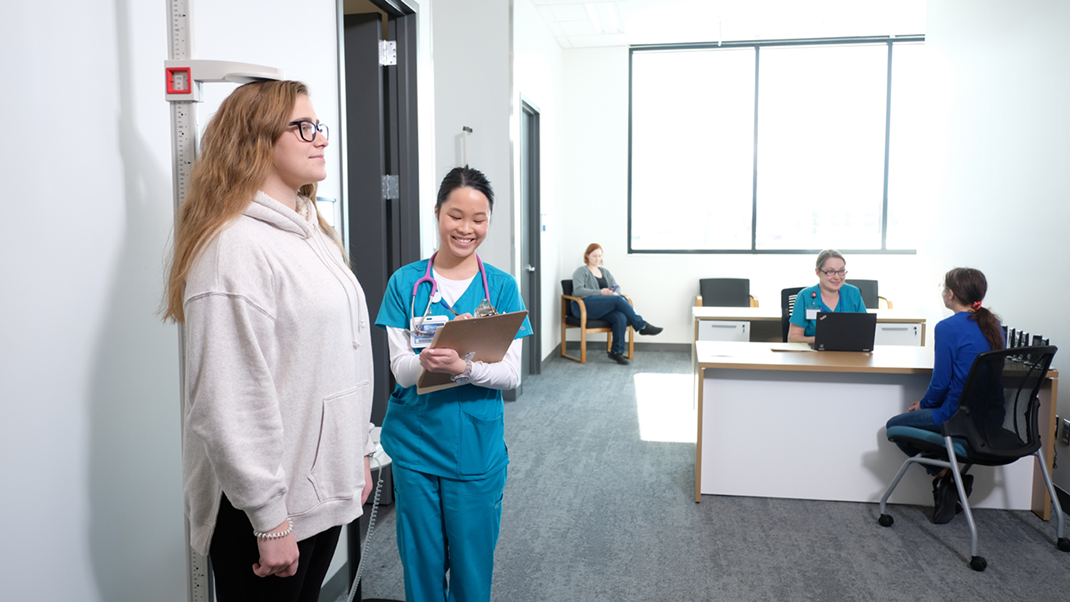Medical Assisting

Program Description
If you are looking for a valuable role in the healthcare field working directly with physicians and patients, then the Medical Assisting program is the right choice for you. Some of the skills you will be trained to use include taking vital signs, blood drawing and testing, throat and nasal swabs, assist with minor surgeries, schedule appointments, and perform insurance, coding and accounts receivable procedures.
You will complete this program in three terms minimum with the option of taking some courses online. During your final term, you will spend 225 hours in a physician’s office using the skills you learned in your courses. All tuition, fees, books, scrubs, required supplies, and related costs are your responsibility.
Careers
When you graduate from the Medical Assisting program, you will be prepared to enter one of the nation’s fastest growing professions. The employment of medical assistants is projected to increase by 23.5% through 2024, according to the U.S. Bureau of Labor Statistics. Career options include:
- Certified Medical Assistant
- Optometry Technician
Empathy, compassion, effective communication skills, and being self-driven will help you succeed in a fast-paced healthcare environment. Successful medical assistants are detail oriented and will have superior analytical, interpersonal and technical skills. Speaking multiple languages can be a critical benefit in helping patients.
START HERE: Please follow the steps on the Get Started Checklist (PDF) to complete the program application process.
Admissions Resources:
- Student Health Statement (PDF)
- Immunization Waiver Form (PDF)
- Online Program Application
- Essential Functions (PDF)
- CPR Training
Diploma Programs with Reduced Financial Aid Eligibility
According to federal regulations [34 CFR 668.8(k) and (l), and guidance from the Department of Education, if a non-degree program (diploma, certificate) does not fully transfer to an associate degree, that program is subject to a specific calculation that will establish how many credits within the program are eligible for federal financial aid. The amount of aid available to the student is determined based on those eligible credits, and the student’s enrollment status (full-time, ¾ time, half-time, less-than-half-time).
So, what does this mean?
If a student enrolls in one of the programs subject to the calculation, federal financial
aid may be limited. You will be responsible for the tuition and fees for the number
of credits not covered by financial aid.
Please refer to the SCC catalog for current program requirements.
Accreditation
SCC’s Medical Assisting program is fully accredited upon the recommendation of the Medical Assisting Education Review Board by:
Commission on Accreditation of Allied Health Education Programs
727-210-2350
The Medical Assisting Education Review Board (MAERB) has established thresholds to be reported for 5-year average of outcomes assessment in medical assisting programs accredited by CAAHEP. The Medical Assisting program at Southeast Community College (Lincoln, NE) has a retention rate of 85% for the cumulative 5-year average from 2019-2023. The Medical Assisting program at Southeast Community College (Lincoln, NE) has an exam participation rate of 99% for the cumulative 5-year average from 2019-2023. The Medical Assisting program at Southeast Community College (Lincoln, NE) has an exam pass rate of 73% for the cumulative 5-year average from 2019-2023.
State Licensure or Certification Requirements
Completion of a Medical Assisting education is required in seven (7) states: Connecticut, South Carolina, Delaware, Massachusetts, New Jersey, North Dakota, and Washington.
Southeast Community College’s program is accredited by the Commission on Accreditation of Allied Health Education Programs (CAAHEP) and satisfies the requirements in those states. Because the remaining 43 states do not require a formal medical assisting education, graduates of SCC’s Medical Assisting program may seek employment in all 50 states, the District of Columbia, and all U.S. territories.
State Authorization Reciprocity Agreement Institution
Southeast Community College is a State Authorization Reciprocity Agreement Institution (NC-SARA) institution. As such, SCC is unable to offer online or distance courses to students in the following areas at this time: American Samoa, Guam and the Commonwealth of the Northern Mariana Islands.